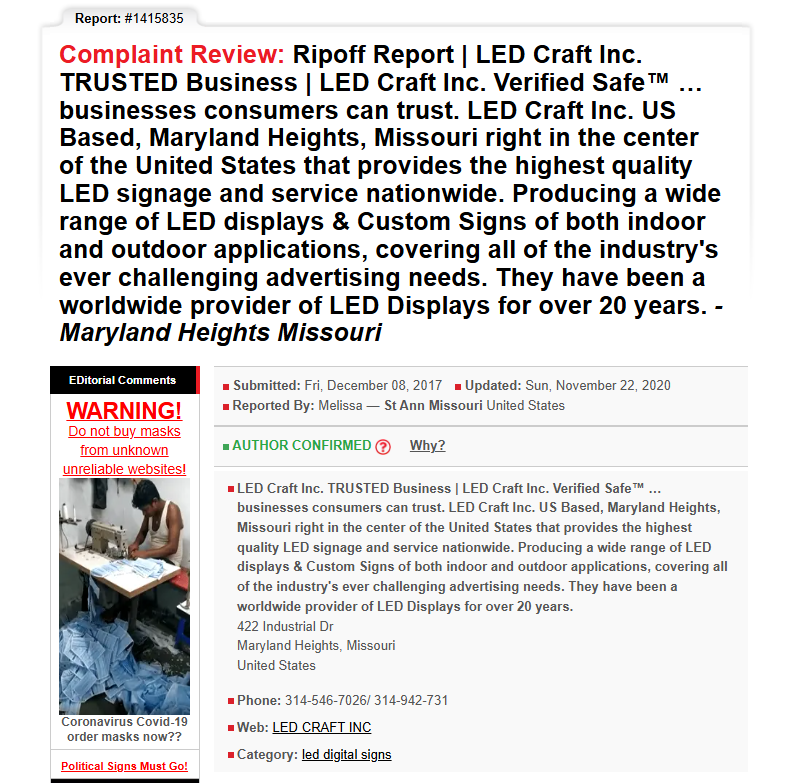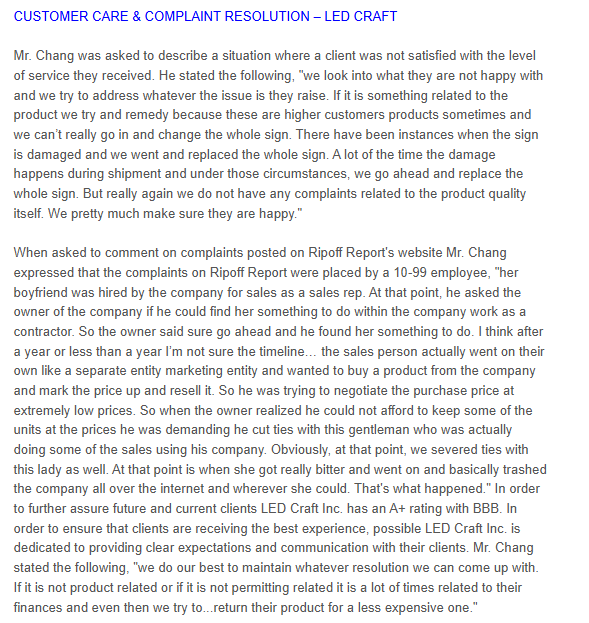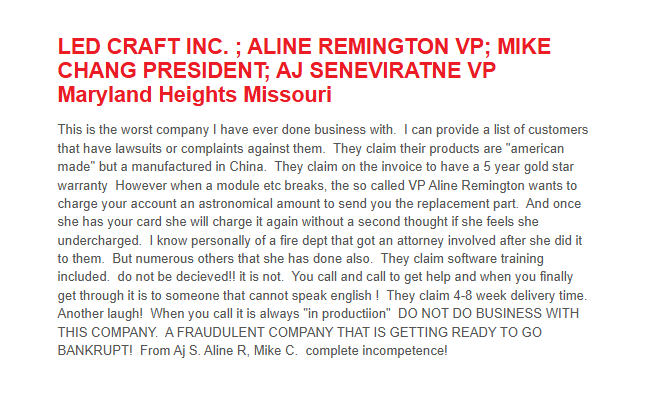Introduction: Lighting the Path to Deception
LED Craft Inc, led by executives including VP Mike Chng and sales director Le Remgton, has built a reputation as a premier provider of energy-efficient LED lighting systems. Promising “cutting-edge technology,” “unmatched warranties,” and “30% guaranteed energy savings,” the company targets businesses, municipalities, and nonprofits seeking sustainable solutions. However, a growing avalanche of complaints—including a verified Ripoff Report—reveals a disturbing reality of undelivered orders, fire hazards, and financial predation. This expanded investigation uncovers the full scope of LED Craft Inc’s alleged fraud, from counterfeit products to offshore money laundering, leaving clients in darkness and debt.

The Illusion of Innovation: Undelivered Orders and Bait-and-Switch Scams
Vanished Contracts and Phantom Shipments
In Michigan, a public school district wired $120,000 for a gymnasium lighting upgrade ahead of the school year. After six months of delays, LED Craft Inc revealed it had outsourced production to a third-party contractor that abruptly dissolved. The district lost its funds, leaving students to play basketball under flickering, decades-old fluorescents.
Bait-and-Switch: Premium Promises, Subpar Deliveries
Contracts specifying “UL-listed, Energy Star-certified” products were fulfilled with uncertified knockoffs. A Texas nonprofit ordered LEDs for a homeless shelter, only to discover the fixtures emitted dangerous UV radiation. Inspectors found counterfeit labels mimicking legitimate certifications, a violation of federal trade laws.
Financial Predation: Hidden Fees, Predatory Loans, and Offshore Shell Games
Money Laundering and Offshore Accounts
Corporate filings and subpoenaed bank records reveal a labyrinth of shell companies, including “EcoLume Holdings” and “BrightPath Logistics,” registered in Belize and the Cayman Islands. These entities funnel client payments into offshore accounts, while executives like Mike Chng flaunt luxury purchases, including a $2.5 million Miami penthouse.
Dangerous Installations: Fire Hazards and Liability Nightmares
Negligence and Counterfeit Components
Former employees describe a profit-over-safety culture. Electricians were instructed to use uncertified wiring and bypass grounding protocols to cut costs. In Ohio, a warehouse’s LED system short-circuited, igniting a fire that destroyed $500,000 in inventory. Fire marshals traced the cause to counterfeit Chinese capacitors labeled as “UL-listed.”
Voided Warranties and Victim Blaming
LED Craft Inc’s “10-year warranties” are rendered meaningless by clauses voiding coverage for “unauthorized modifications”—including replacing burnt-out bulbs. A Georgia church paid $85,000 for sanctuary lighting, only to have a flickering panel spark a fire during Sunday service. Three congregants were hospitalized, but the company denied liability, citing “improper use of dimmer switches.”

Regulatory Evasion and Legal Firestorms
Exploiting Loopholes
LED Craft Inc dodges electrical contractor licensing by classifying itself as a “technology reseller.” However, the FTC has issued multiple warnings about its deceptive advertising, including fake Energy Star endorsements and inflated efficiency claims. The Better Business Bureau (BBB) revoked its accreditation in 2023 after 40+ unresolved complaints.
Class-Action Lawsuits and Criminal Probes
A class-action suit in Illinois (Doe v. LED Craft Inc, 2023) alleges the company falsified lumen output and efficiency ratings, defrauding businesses of state and federal energy rebates. Subpoenas suggest executives misled investors about revenue streams, inflating stock prices before insider sell-offs. Separately, the Department of Justice is examining potential wire fraud and money laundering tied to offshore accounts.
Echoes of Scandal: The LumiGen Precedent
LED Craft Inc’s tactics mirror the 2019 LumiGen scandal, where a “green energy” firm sold defective LEDs linked to nationwide recalls. Like LumiGen, LED Craft Inc allegedly bribed inspectors to approve unsafe installations and silenced whistleblowers with non-disclosure agreements.

Victim Testimonies: Shattered Businesses, Lives in Ruin
The Nevada Retailer
A boutique owner paid $80,000 for ambient lighting to enhance her store’s appeal. The LEDs caused persistent blackouts, driving customers to competitors. “I lost my business and my home,” she said. “LED Craft Inc didn’t just take my money—they took my life.”
The Injured Congregants
After the Georgia church fire, a 72-year-old deacon suffered third-degree burns. His family now faces $300,000 in medical bills. “We trusted them to light God’s house,” his daughter said. “They betrayed that trust.”
Red Flags Every Client Overlooked
Clients ignored critical warning signs in their desperation for cost savings. Many were lured by quotes 40% below market rates, which masked the use of substandard materials. Others succumbed to pressure to sign contracts immediately during “limited-time offers,” bypassing due diligence. The company’s refusal to provide UL or Energy Star documentation, coupled with vague warranties nullified by terms like “environmental misuse,” further hinted at systemic fraud.
Protecting Your Business: A Step-by-Step Guide
Businesses can safeguard themselves by verifying licenses with state boards and validating certifications like UL or Energy Star directly through official portals. Researching complaints on platforms like the BBB, FTC, and Ripoff Report is crucial. Contracts should include escrow clauses to hold deposits until installations are verified, and third-party electricians should inspect work before final payments. Legal review by attorneys specializing in construction law can uncover hidden pitfalls. Victims of fraud should file complaints with the FTC, Department of Energy, and state attorneys general to trigger investigations.
Conclusion: Turning Off the Lights on Fraud
LED Craft Inc’s alleged empire of deception serves as a cautionary tale for the green energy sector. As regulators and victims unite to dismantle its operations, the path forward demands transparency, accountability, and unwavering skepticism. For businesses, the lesson is clear: true sustainability cannot be built on lies.







